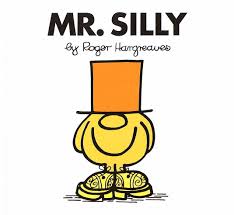silly

adj. 愚蠢的
n. 傻瓜
n. (Silly)人名;(匈)希伊;(法)西利
adj.
蠢的;糊涂的;不明事理的;没头脑的
n.
(常用于向孩子指出其愚蠢行为)傻孩子,淘气鬼;傻子,蠢货;
变形
复数:sillies
双语释义
adj.(形容词)傻的,糊涂的 having or showing a lack of good sense and judgment; foolish; not serious or sensible
[P] 不省人事的,失去知觉的 unable to think or feel clearly; senseless
英英释义
silly
n.a word used for misbehaving children
"don't be a silly"
adj.
ludicrous, foolish
"a silly idea"
同义词:cockamamiecockamamygoofysappywackywhackyzany
lacking seriousness; given to frivolity
"silly giggles"
同义词:airheadeddizzyempty-headedfeatherbrainedgiddylight-headedlightheaded
inspiring scornful pity
"how silly an ardent and unsuccessful wooer can be especially if he is getting on in years"
同义词:patheticridiculous
dazed from or as if from repeated blows
"knocked silly by the impact"
同义词:punch-drunkslaphappy
词汇搭配
用作形容词 (adj.)
~+名词
silly little boy傻小子
silly advice糊涂的意见
silly idea愚蠢的看法
silly mistakes愚蠢的错误
silly question愚蠢的问题
silly reason可笑的理由
silly remarks憨话
~+动词不定式
silly to say that那样说真蠢
silly to trust sb相信…真傻
动词+~
look silly看上去很傻
~+介词
silly about在…方面愚蠢的
silly of you你真傻
词组短语
silly season新闻缺乏时期
silly billy[口]傻瓜;笨蛋
silly idea愚蠢的想法
同近义词辨析
ridiculous, silly, absurd这组词都有“愚蠢,可笑”的意思,其区别是:
ridiculousa.荒唐可笑的,指因为愚昧无知而令人发笑并成为笑柄,含有蔑视成分。
It is ridiculous to judge a foreign culture only by its food.仅仅根据一个国家的饮食来评价该国家的文化是荒唐可笑的。
sillya.愚蠢的,傻的,指由于单纯或者头脑简单而显得愚蠢。
a silly little boy傻小子
absurda.荒谬的,可笑的,指因不符合常识、违反真理或不合逻辑而令人发笑。
There was an absurd idea that the earth was flat and motionless.过去曾经有一种荒谬的观点认为地球呈扁平状而且静止不动。
silly, stupid, foolishsilly“傻”,着重头脑简单,不懂事,有单纯,糊涂的意味;
stupid着重生理迟钝,反应迟钝
foolish“蠢”,着重缺乏智力或判断力;
silly, dull, simple, stupid, foolish这组词都有“愚蠢的,笨的,傻的”的意思,其区别是:
silly口语用词,可和foolish互换,但语气稍强。侧重指人的言行不合常规或不理智,强调单纯、低能和糊涂。
dull指对问题理解迟钝,缺乏灵敏机智头脑,可能是先下智力低下,也可能因疲倦或健康不佳所致。
simple强调头脑简单或缺少智慧。
stupid多指人或行为的愚蠢,尤指先天智能低下,或因某种原因失去正常的反应或感觉。有时也可与silly和foolish换用,但语气强,常含贬义。
foolish一般指人的无头脑、愚蠢,或缺乏常识与判断力,或指行动的愚蠢可笑。
双语例句
用作形容词(adj.)
The silly ending robs the plot of any credibility.
这愚蠢的结尾使得整个情节变得一点都不可信。
Don't get upset over silly things that people say.
不要在意人们的闲言碎语。
I look pretty silly in this dress.
我穿这条裙看上去很可笑。
I took a swing at him and knocked him silly.
我挥拳打了他一下, 把他打得晕头转向。
用作名词(n.)
Listen, silly, we have to leave now.
听着,小淘气鬼,我们现在得走了。
He is not a silly boy,not by a jugful.
他不是一个傻孩子。
No, silly, those aren't your shoes!
不对,傻孩子,那不是你的鞋!
权威例句
SUV: from silly useless value to smart uptake valueSUV: standard uptake or silly useless value?
ABRASIVE FLOW MACHINING WITH NOT-SO-SILLY PUTTY.
“SUCH A SILLY SCHEME”: THE PRIVATISATION OF BRITAIN’S RAILWAYS 1992–2002
Keyes JW Jr. SUV: standard uptake or silly useless value
Powered flight, child's play, silly wheels and walking machines
"Silly walks"in Parkinson's disease: unusual presentation of dopaminergic-induced dyskinesias
"A little silly and empty-headed": older adults' understandings of social networking sites
'Did you have permission to smash your neighbour's door?' Silly questions and their answers in police–suspect interrogations
Are Neighbour Methods Preferable to Analysis of Variance for Completely Systematic Designs? `Silly Designs are Silly!'
silly
silly: [OE] In one of the more celebrated semantic volte-faces in the history of the English lexicon, silly has been transformed over the past millennium from ‘blessed, happy’ to ‘stupid’. The word goes back ultimately to a prehistoric West Germanic *sǣliga, a derivative of *sǣli ‘luck, happiness’. It reached Old English as gesǣlig, still meaning ‘happy’, but as it evolved formally in Middle English through seely to silly, its meaning developed via ‘blessed’, ‘pious’, ‘innocent, harmless’, ‘pitiable’, and ‘feeble’ to ‘feeble in mind, foolish’. The related German selig retains its original meaning ‘happy, blessed’.
silly (adj.)
Old English gesælig "happy, fortuitous, prosperous" (related to sæl "happiness"), from Proto-Germanic *sæligas (cognates: Old Norse sæll "happy," Old Saxon salig, Middle Dutch salich, Old High German salig, German selig "blessed, happy, blissful," Gothic sels "good, kindhearted"), from PIE *sele- "of good mood; to favor," from root *sel- (2) "happy, of good mood; to favor" (cognates: Latin solari "to comfort," Greek hilaros "cheerful, gay, merry, joyous").
This is one of the few instances in which an original long e (ee) has become shortened to i. The same change occurs in breeches, and in the American pronunciation of been, with no change in spelling. [Century Dictionary]
The word's considerable sense development moved from "happy" to "blessed" to "pious," to "innocent" (c. 1200), to "harmless," to "pitiable" (late 13c.), "weak" (c. 1300), to "feeble in mind, lacking in reason, foolish" (1570s). Further tendency toward "stunned, dazed as by a blow" (1886) in knocked silly, etc. Silly season in journalism slang is from 1861 (August and September, when newspapers compensate for a lack of hard news by filling up with trivial stories). Silly Putty trademark claims use from July 1949.1. Her work is full of silly mistakes.
她满篇都是愚蠢的错误。
《牛津词典》
2. No, silly, those aren't your shoes!
不对,傻孩子,那不是你的鞋!
《牛津词典》
3. We had to wear these silly little hats.
我们不得不戴这些傻里傻气的小帽子。
《牛津词典》
4. Let's have done with this silly argument.
我们结束这场无聊的争辩吧。
《牛津词典》
5. He was a pesky tourist asking silly questions.
他是个问愚蠢问题的讨厌的游客。
《柯林斯英汉双解大词典》
6. You silly boy!
你这傻小子!
《牛津词典》
7. They're getting awfully weary of this silly war.
他们对这场愚蠢的战争感到极其厌倦。
《柯林斯英汉双解大词典》
8. At one point we quarrelled, over something silly.
有一次,我们为了一件愚蠢的事争论起来。
《柯林斯英汉双解大词典》
9. A ghost indeed! I've never heard anything so silly.
真是见鬼!我可从没听说过这样无聊的事。
《牛津词典》
10. The person next to me piped up with a silly comment.
我旁边那位愚蠢地评论起来。
《牛津词典》
11. She's worn to a frazzle with her silly speech competition.
她被自己愚蠢的演讲比赛搞得精疲力竭。
《柯林斯英汉双解大词典》
12. He doesn't say those silly things that unthinking people say.
他不说那些考虑不周的人才会说的傻话。
《柯林斯英汉双解大词典》
13. My best friend tells me that I am silly to be upset about this.
我最好的朋友说我为此事心烦太傻了。
《柯林斯英汉双解大词典》
14. Everything about the party was overdone and silly: the band, the balloons, the paper hats.
这个聚会的一切都过了头而且愚蠢:乐队,气球和纸帽子。
《柯林斯英汉双解大词典》
15. Grades are just silly letters.
成绩只不过是无聊数字。
youdao
16. So, uh, my question is so silly.
那么,嗯,我的问题太愚蠢了。
youdao
17. "I'm so silly!" cried the keeper.
“我好傻!”看守员叫道。
youdao
18. "Don't be silly," Nick's mom said.
“别傻了。”尼克的妈妈说。
youdao
19. Don't be silly, Medlock.
别傻了,梅德洛克太太。
youdao
20. I'm fed up with your silly questions.
我对你这些愚蠢的问题厌烦了。
youdao
21. I regretted doing such a silly thing.
我后悔做了这样愚蠢的事。
youdao
22. He's silly. He‘s lazy.
他很傻,很懒。
youdao
23. No, it isn't silly.
不,这并不是愚蠢。
youdao
24. Dreaming about seeing through walls may sound silly.
梦想着能够隔墙看物,这样的想法可能听起来有些愚蠢。
youdao
25. I feel silly in these clothes.
穿上这些衣服,我觉得很可笑。
《牛津词典》
26. That was a silly thing to do !
那事做得蠢!
《牛津词典》
27. I hate her, the silly old cow!
我恨她,那个笨蛋老女人!
《牛津词典》
28. She had a silly grin on her face.
她一脸憨笑。
《牛津词典》
29. For some, it may seem silly, a storm in a teacup.
对有些人来说,这似乎很荒唐,是小题大做。
《柯林斯英汉双解大词典》
30. Don't play silly games with me; I know you did it.
别跟我兜圈子,我知道是你干的。
《牛津词典》
